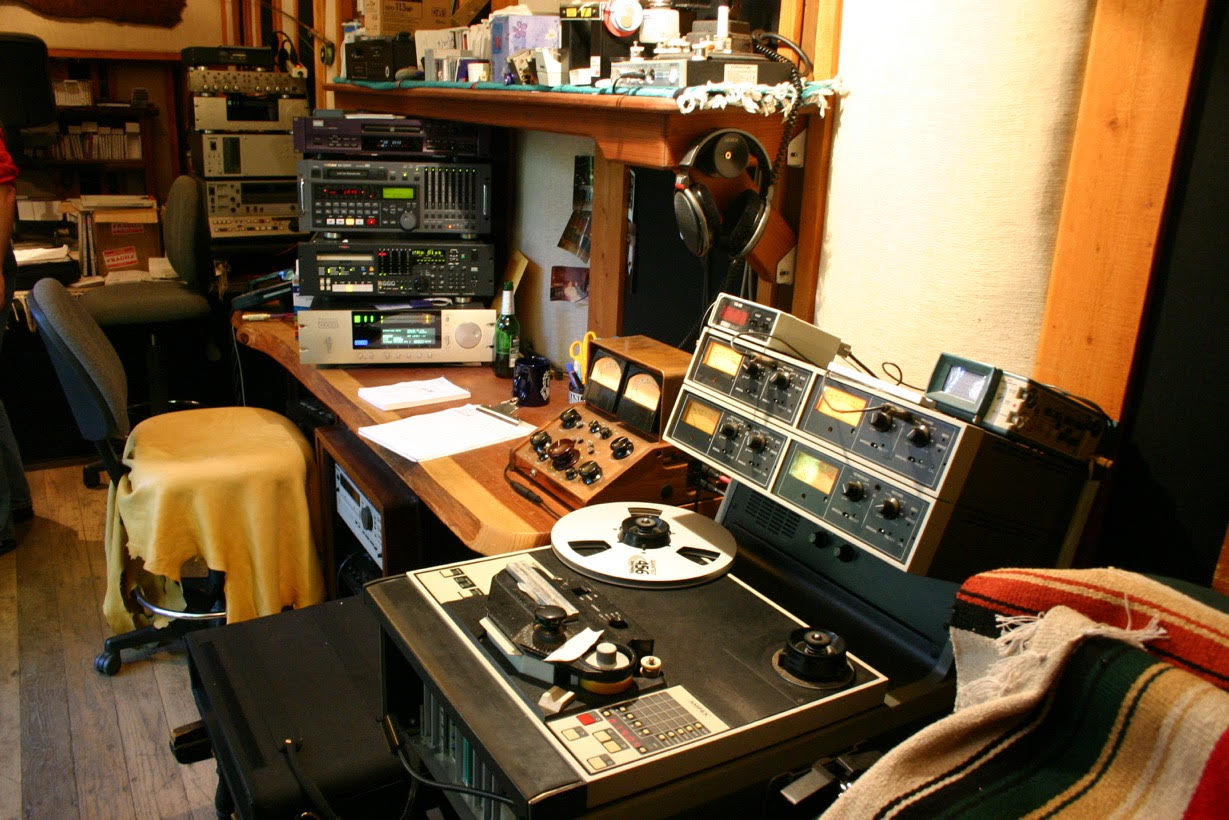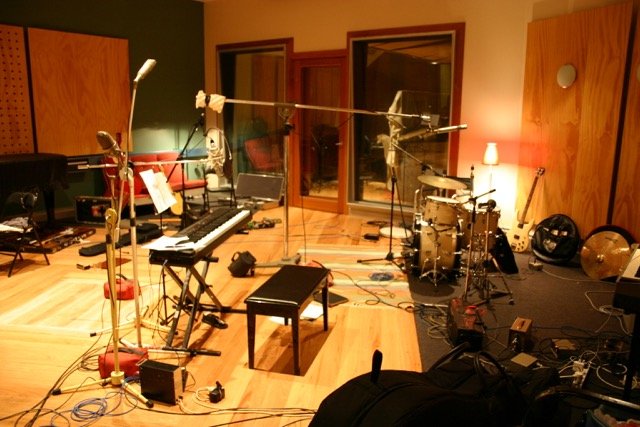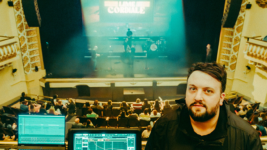News
24 Mar 2021
Listen Here: Where are the grace notes?

Subscribe to CX E-News
Some people choose a career in sound; others stumble across it like a lost hiker. This latter, far larger group often started out in the audio industry working any job they could while they figured out what they wanted to do in life. For others, assisting in a studio was a cheap way to record an album after-hours (which doesn’t really happen now). Then there were the musicians who gravitated towards engineering either because they found it fascinating or disliked the methods of the engineers with whom they worked.
I was in this last camp. In fact, if it wasn’t for a Drawmer gate placed on my snare drum during my first-ever recording session that cut out all my grace notes, I may have become an architect!
In 1984, when I was about 16, the band I was in recorded an EP to 8-track half-inch at the Jam Tin, a small studio inside an industrial estate in Moorabbin (I think) that was owned (from memory) by none other than Bruce Johnson. I also have a vague recollection that the message on the studio phone at the time was a recording of Bruce faking a British accent. God only knows why: “Hello, Jam Tin ’ere… can’t take your call – leave a message.”
Being the ’80s, I spent the first 18 hours of my inaugural Jam Tin session sound checking drums with Greg Simmons (long-time engineer, and founder of Audio Technology Magazine) while the rest of the band sat out Day 1, stupefied with boredom from their lack of participation. Finally, at about 2 am the next morning I was allowed to start capturing some ‘performances,’ but only parts of them, mind you!
This was the ’80s: isolate every sound; separate the ‘spill’. For a drummer, this meant recording kick, snare and hi-hat first, then toms separately, then cymbals after that. It was akin to getting a guitarist to play his or her lead break one string at a time.
The whole process was insane. Not only was it technically misguided, it was antithetical to musical performance. The experience was so torturous, in fact, that it led me to a pivotal realisation (which would go on to affect my future in audio): that there had to be a better way to record music; not only a more empathetic way to treat musicians, but a superior way to capture performances and sound.
So began my slide from conventional society into the audio industry! Gone was my future in architecture, lost was any hope my father had of his third son following in his footsteps and becoming a dental surgeon, and almost scuppered was my motivation to graduate from high school! (I did finish in the end, adding a degree in English and Philosophy at Melbourne Uni soon after.)

Thirty-six years later I’m still here: still producing, mixing and mastering albums for all and sundry, still writing for CX (even though I’m still the new guy, despite this being my 93rd Issue on the trot!) and still uncoiling leads only to discover that the XLR in my hand is the wrong sex to go into a mic.
How Did I Get Here? Letting The Days Go By
I’ve spent well over three decades now making albums without ever really feeling like what I did in the audio/music industry constituted a ‘career.’ I think it’s only in the last few years that I’ve come to see it this way – probably because it’s a bit late to start anything else!
For me, music was everything, and it was this singular focus that led me naturally into various roles inside the industry. I’ve worked in studios literally since I was a kid on hundreds of albums, from both sides of the glass, playing instruments as well as producing, engineering or mastering. I’ve also done other things under the larger ‘sound’ umbrella: I’ve played live for decades in countless bands, subsequently recording the albums of many of them. I worked at the Falls Festival for years down in Lorne, Victoria (on a stage which I helped build!); did a couple of years on the Big Day Out; spent almost a decade editing Audio Technology magazine; and built several recording and mastering studios in Sydney when I lived up there.

When asked by others outside the industry what I do for a crust, I hesitate to answer, barely knowing where to start. When someone inside the industry asks the same question, I say this: “I’m a producer, an engineer, a mix and mastering engineer, and a writer… I mix a bit live too now at the new Caravan Club, and also run a consultancy business called The Pro Audio Shop, selling equipment to audio enthusiasts and industry professionals who need help working out what they should buy, or can afford.”
That’s the short version unfortunately… you can see why I hesitate.
About 15 years ago, when I was still Audio Technology’s editor, I met my wife Sierra at the AES trade show in San Francisco. She was working for Universal Audio at the time, and nowadays we live on 20 acres south of Melbourne raising two kids. I run a studio down here called The Mill, which many readers of CX know all too well, and also the aforementioned Pro Audio Shop, which is a business I set up a few years ago after realising I couldn’t keep talking to people on the phone every day about what gear they should buy, without having something to show for it! In short, all those phone calls were sending me broke.
Looking Through A Glass Onion
Do I regret stumbling onto the audio path and never extricating myself from it? Not for one second. My life in this industry has been amazing, and nothing if not diverse. I’ve done some fairly surreal and exciting things over the years; spent a day at Neil Young’s Broken Arrow Ranch; lectured at trade shows with the likes of Geoff Emmerick, Richard Lush, George Massenberg and Bruce Jackson; worked live with Iggy Pop, The Wailers, Blondie, Foo Fighters, Red Hot Chilli Peppers (and countless others); met odd characters like Les Paul, Bootsie Collins, Neil Young and Paul Stanley (to name a few). The list of interesting albums I’ve worked on, performances I’ve witnessed, people I’ve met and experiences I’ve had far exceeds the pages of this mag, but I’m mindful that none are particularly interesting to anyone but me. Suffice it to say it’s been a fascinating, challenging and fulfilling trip thus far…
It hasn’t been without its frustrations, of course, but like any job it’s been about the relationships I’ve forged along the way with the countless like-minded people I’ve worked with. Making the most of opportunities has been a crucial aspect of any successes I’ve had, and looking back on my career… well, put it this way, looking back isn’t something I like to do.
One point I’d like to make about that: I know many people in the audio industry feel a keen sense of job insecurity at times, which can lead to feelings of anxiety about where the next meal’s coming from (particularly at the moment). This is a terrible emotion to live with day-to-day, and unhealthy both mentally and physically.
One way I’ve learned to combat this is by looking back at the hundreds of productions I’ve been involved with over the years, recognising that there has been a long and consistent workflow in that time. Doing this gives me confidence that there is always new work ahead, even if I can’t see it, and nothing is as bleak as it might seem. When you only look forward, sometimes all you see is a fog of doubt about what’s coming down the pipe next. But something always is.
And the reason I write for CX Magazine today? Because I love this industry like my family, and I love sharing what I’ve learned about sound with others. I’ve worked in almost every role the musical side of the audio industry has to offer, which has given me a wealth of experience over the years and a somewhat unique perspective on things. I like to share this with readers in the pages of this magazine by (hopefully) providing some insight into the deeper aspects of sound production, which might benefit others or help improve their work.
These days I’m pretty confident about what I know, and what I don’t. If there’s one thing I’ve learnt over the years, it’s that confidence is king. When you’re recording, mixing (live, or in the studio) or even mastering, you’ve got to back yourself; your judgement, your ears and your skills. Listen to the speakers in front of you, imagine a world beyond them, and realise that vision for everyone else to hear. The audience deserves it; the musicians deserve it; you deserve it.
Looking forward to seeing everyone again in the flesh some time soon!
Subscribe
Published monthly since 1991, our famous AV industry magazine is free for download or pay for print. Subscribers also receive CX News, our free weekly email with the latest industry news and jobs.




